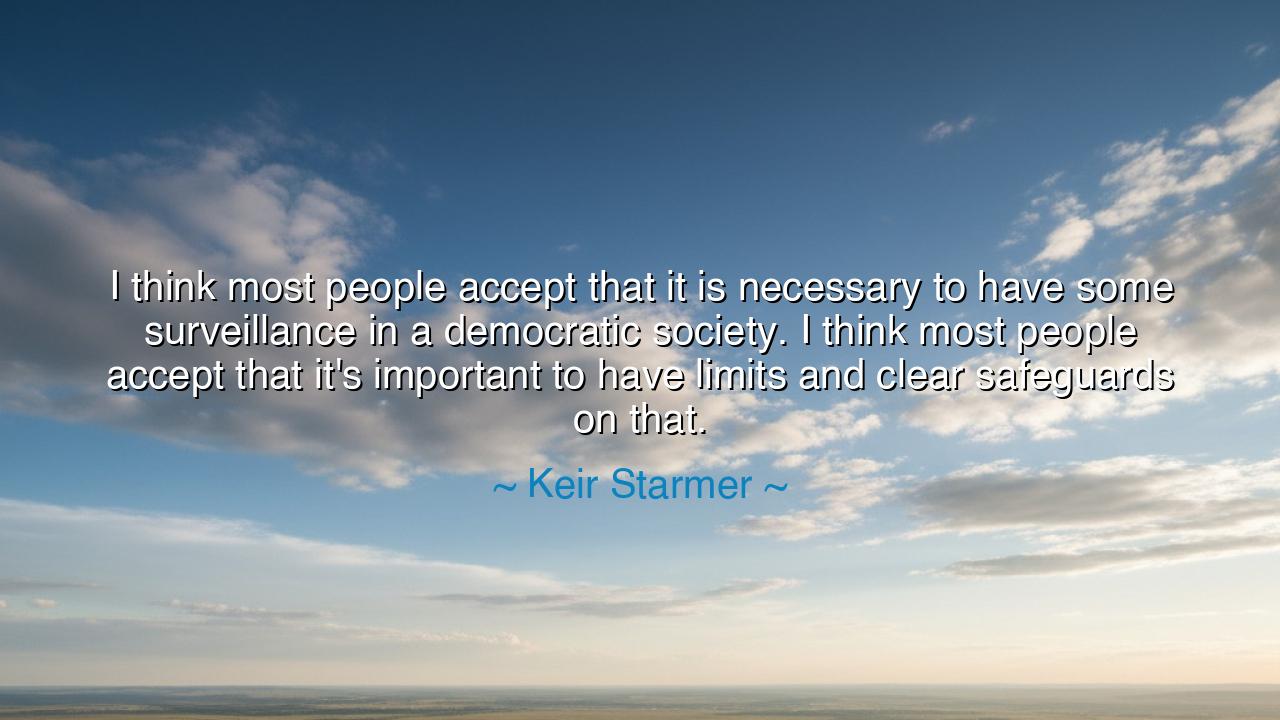
I think most people accept that it is necessary to have some
I think most people accept that it is necessary to have some surveillance in a democratic society. I think most people accept that it's important to have limits and clear safeguards on that.






Keir Starmer, a man trained first in the discipline of law and later entrusted with the weight of politics, once declared: “I think most people accept that it is necessary to have some surveillance in a democratic society. I think most people accept that it’s important to have limits and clear safeguards on that.” These words, though born of the modern struggle between liberty and security, speak with the timeless voice of wisdom. For every age has wrestled with this question: how much power should the state hold over its people, and how can that power be contained so that it protects rather than enslaves?
The meaning is layered. On one hand, surveillance is a tool of protection. In a dangerous world, where threats come from within and without, societies cannot afford blindness. To guard citizens, to prevent harm, there must be some measure of watchfulness. This is the shield of the state. Yet on the other hand, limits and safeguards are the chains that keep this shield from becoming a sword turned against the very people it claims to defend. Without restraint, surveillance mutates into tyranny. Starmer’s wisdom lies in recognizing that the balance between these forces is the lifeblood of a democratic society.
History bears witness to both extremes. Consider the Roman Republic, which appointed dictators in times of crisis but bound them by term and law. When the limits were respected, the Republic endured, protected yet free. But when those safeguards eroded—when men like Sulla and Caesar seized extraordinary powers without yielding them—the Republic fell into empire, and freedom was lost. The lesson is ancient but eternal: security without restraint devours democracy.
Another example can be found in the twentieth century. During the Second World War, Britain and the United States expanded their surveillance powers, intercepting communications, monitoring citizens, and centralizing control to guard against espionage and sabotage. In times of mortal danger, such measures were accepted. Yet after the war, both nations recognized the danger of permanent overreach, and institutions were reformed to restore liberty. By contrast, in East Germany, the Stasi perfected the machinery of surveillance without limits or safeguards. There, neighbors spied upon neighbors, trust was shattered, and fear became the foundation of society. What was meant to protect instead imprisoned an entire nation.
Starmer’s words, then, are not merely political commentary; they are an inheritance of these lessons. A democratic society requires vigilance, yes—but vigilance both against external threats and against the slow creep of authoritarianism. The people must accept that some watchfulness is needed, but they must also demand that it be bounded by transparency, law, and accountability. For the very moment surveillance becomes limitless, it ceases to be a protector and becomes the enemy within.
The lesson for us is clear and urgent: never yield your freedoms blindly in the name of safety. Demand both protection and restraint. Insist upon safeguards—independent courts, transparent oversight, and laws that limit the hand of the state. At the same time, recognize that security is not the foe of liberty but its necessary companion, so long as balance is preserved. It is not surveillance itself that destroys freedom, but surveillance without boundaries.
Practical action lies before us. As citizens, we must ask questions when governments expand surveillance powers. We must support leaders and institutions that recognize the necessity of both safety and freedom. We must refuse the false choice between liberty and security, for true democracy requires both. And in our daily lives, we must cultivate trust, responsibility, and vigilance, so that the machinery of the state does not grow unchecked.
Thus, let Starmer’s words be carried forward as a guide: “Surveillance is necessary, but with limits and safeguards.” For in this balance lies the very soul of democracy. Without protection, a people perish. Without restraint, a people are enslaved. But when both walk together—shield and chain, safety and freedom—then a democratic society can endure through storm and shadow, standing tall among the nations of the earth.






AAdministratorAdministrator
Welcome, honored guests. Please leave a comment, we will respond soon